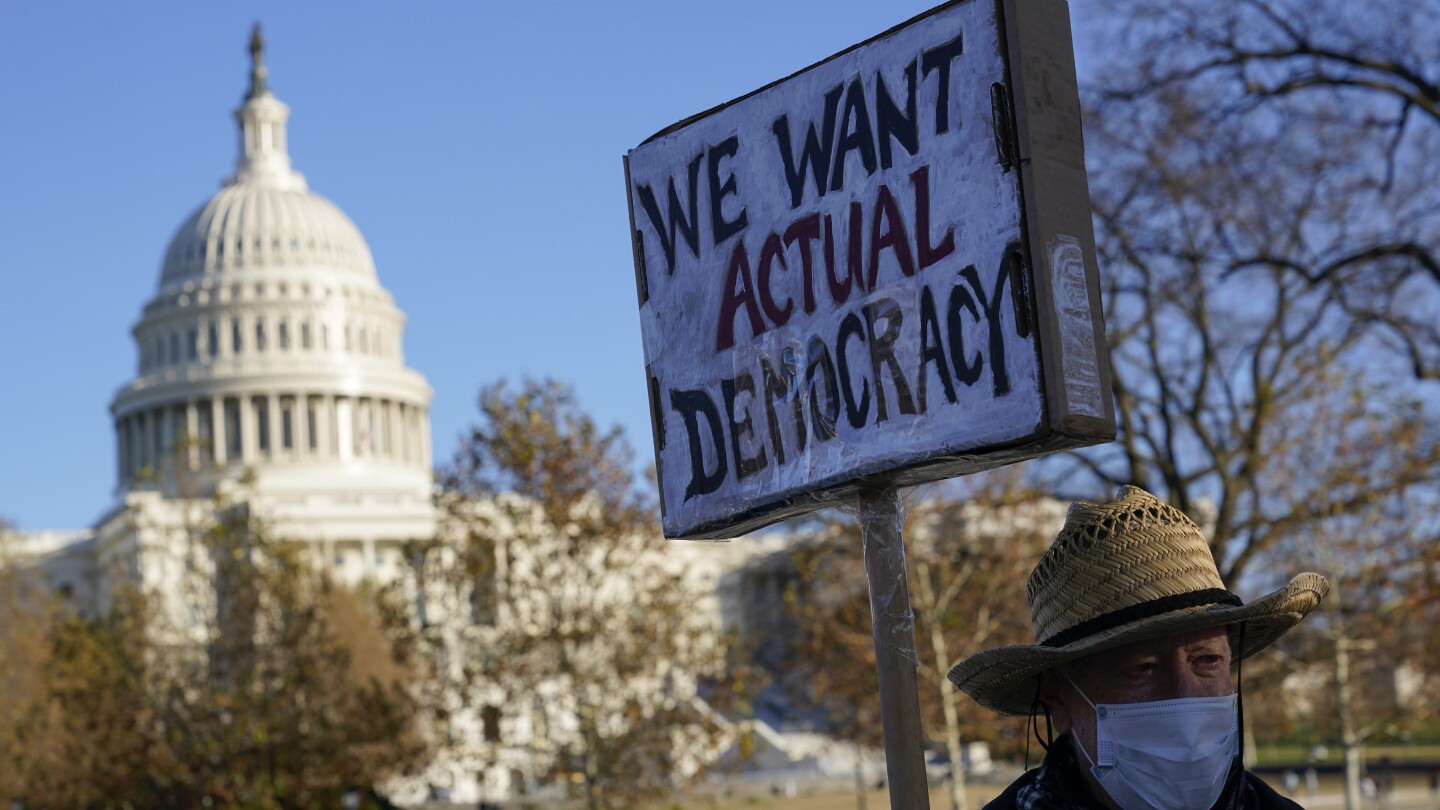- cross-posted to:
- politics
- cross-posted to:
- politics
WASHINGTON (AP) — Only about 1 in 10 U.S. adults give high ratings to the way democracy is working in the United States or how well it represents the interests of most Americans, according to a new poll from The Associated Press-NORC Center for Public Affairs Research.
Majorities of adults say U.S. laws and policies do a poor job of representing what most Americans want on issues ranging from the economy and government spending to gun policy, immigration and abortion. The poll shows 53% say Congress is doing a bad job of upholding democratic values, compared with just 16% who say it’s doing a good job.
The findings illustrate widespread political alienation as a polarized country limps out of the pandemic and into a recovery haunted by inflation and fears of a recession. In interviews, respondents worried less about the machinery of democracy — voting laws and the tabulation of ballots — and more about the outputs.
Overall, about half the country — 49% — say democracy is not working well in the United States, compared with 10% who say it’s working very or extremely well and 40% only somewhat well. About half also say each of the political parties is doing a bad job of upholding democracy, including 47% who say that about Democrats and even more — 56% — about Republicans.
“I don’t think either of them is doing a good job just because of the state of the economy — inflation is killing us,” said Michael Brown, a 45-year-old worker’s compensation adjuster and father of two in Bristol, Connecticut. “Right now I’m making as much as I ever have, and I’m struggling as much as I ever have.”
A self-described moderate Republican, Brown has seen the United States falling short of its democratic promise ever since learning in high school that the Electoral College allows someone to become president while not winning the majority of national votes. But he’s especially disappointed with Congress now, seeing its obsessions as not reflective of the people’s will.
“They’re fighting over something, and it has nothing to do with the economy,” Brown said, singling out the GOP-controlled House’s investigation of President Joe Biden’s son.
“Hunter Biden — what does that have to do with us?” he asked.
The poll shows 53% of Americans say views of “people like you” are not represented well by the government, with 35% saying they’re represented somewhat well and 12% very or extremely well. About 6 in 10 Republicans and independents feel like the government is not representing people like them well, compared with about 4 in 10 Democrats.
Karalyn Kiessling, a researcher at the University of Michigan who participated in the poll, sees troubling signs all around her. A Democrat, she recently moved to a conservative area outside the liberal campus hub of Ann Arbor, and worried that conspiracy theorists who believe former President Donald Trump’s lies that he won the 2020 election would show up as poll watchers. Her Republican family members no longer identify with the party and are limiting their political engagement.
Kiessling researches the intersection of public health and politics and sees many other ways to participate in a democracy in addition to voting — from being active in a political party to speaking at a local government meeting. But she fears increased partisan nastiness is scaring people away from these crucial outlets.
“I think people are less willing to get involved because it’s become more contentious,” Kiessling, 29, said.
That leads to alienation at the national level, she said — something she certainly feels when she sees what comes out of Washington. “When you have a base that’s a minority of what general Americans think, but they’re the loudest voices in the room, that’s who politicians listen to,” Kiessling said.
Polarization has transformed some states into single-party dominions, further alienating people like Mark Short, a Republican who lives in Dana Point, California.
“In California, I kind of feel that I throw my vote away every time, and this is just what you get,” said Short, 63, a retired businessman.
The poll shows that the vast majority of Americans — 71% — think what most Americans want should be highly important when laws and policies are made, but only 48% think that’s actually true in practice.
Many in US see gap between what should be important in lawmaking vs. what actually is
An AP-NORC poll finds 71% of U.S. adults think it’s important for laws to reflect what most Americans want, while only 48% feel that is actually the case.
And views are even more negative when it comes to specific issues: About two-thirds of adults say policies on immigration, government spending, abortion policy and gun policy are not representative of most Americans’ views, and nearly that many say the same about the economy as well as gender identity and LGBTQ+ issues. More than half also say policies poorly reflect what Americans want on health care and the environment.
Majorities of US adults say policies don’t align with popular opinion on many issues
An AP-NORC poll finds that Democrats and Republicans disagree about which policy areas are most out of step with public opinion.
Joseph Derito, an 81-year-old retired baker in Elmyra, New York, sees immigration policy as not representing the views of most Americans. “The government today is all for the people who have nothing — a lot of them are capable of working but get help,” said Derito, a white political independent who leans Republican and voted for Trump. “They just want to give these people everything.”
Sandra Wyatt, a 68-year-old retired data collection worker and Democrat in Cincinnati, blames Trump for what she sees as an erosion in democracy. “When he got in there, it was like, man, you’re trying to take us back to the day, before all the rights and privileges everybody fought for,” said Wyatt, who is Black, adding that she’s voted previously for Republicans as well.
She sees those bad dynamics as lingering after Trump’s presidency. “We always knew there was racism but now they’re emboldened enough to go around and shoot people because of the color of their skin,” Wyatt said.
Stanley Hobbs, a retired autoworker in Detroit and a Democrat, blames “a few Republicans” for what he sees as democracy’s erosion in the U.S. He sees those GOP politicians as beholden to a cabal of big businesses and points to issues like abortion as examples of how the laws no longer represent the views of the majority of Americans.
He’s trying to stay optimistic.
“It seems like this always happens in the U.S. and we always prevail,” Hobbs said, recalling how American politicians sympathetic to Nazi Germany gained prominence before World War II. “I just hope we prevail this time.”
The poll of 1,220 adults was conducted June 22-26 using a sample drawn from NORC’s probability-based AmeriSpeak Panel, which is designed to be representative of the U.S. population. The margin of sampling error for all respondents is plus or minus 3.9 percentage points.
There are a few reasons and many aren’t really new. I think a major part of it is just the two party system where it feels like you only have two options. Sure one is way worse but neither are ideal so most people are voting against the worst option rather than for something. I suspect the ones voting for something are more or less single issue voters or drank kool-aid. Then gerrymandering might make the vote basically pointless anyway.
Another problem is gridlock and effectiveness. For me the Democrats aren’t left enough and I don’t agree with their gun policy. For the policies I do agree with they don’t really seem to get much done. The system won’t feel like it’s working if it doesn’t infact do shit. Also if there was fewer problems in people’s lives they might not feel like shit needs to happen but there are some pretty obvious issues going on.
For a lot of people they get very upset about court rulings or “gifts”. These sorts of things often don’t feel democratic or fair. The effects of rolling back Roe are obviously bad but at the same time where were the federal protections put into place by the legislative branch? Why was it that courts were the only place to fix anti-abortion laws? When you look at the rulings involving guns I would agree with them but people against them often dismiss them as just another corrupt ruling. Seems like mainly just because they don’t agree. There doesn’t seem to be much reflection on that side about what the states were doing to get those rulings. There might be if the courts didn’t have other problems.
Then there is the whole fascism thing. That shouldn’t be popular. People voting for it doesn’t exactly give me hope for the state of democracy. Laws reduceing people’s freedom doesn’t either. There is also the weird pro-corporate stuff like corporate personhood concepts. For some reason money equals speech and some places are giving companies literal votes.
☝️ ☝️ ☝️ All of that.
That still should not discourage anyone from getting out and voting. In fact, it should energize everyone to do their part. Voter apathy is the only point you missed, really. If everyone who stays home because “my vote doesn’t matter” would actually get out and vote for the change they want, we might be able to pull ourselves out of this mess.
Yes, people should still vote, it can matter. Especially for local stuff, or just as a protest vote.
My personal apathy is still quite high but I vote in every election I can. I do a bit of research on the ballet to just pick the least bad and get it over with. It’s like taxes or car maintenance but you don’t have to do it as often.



